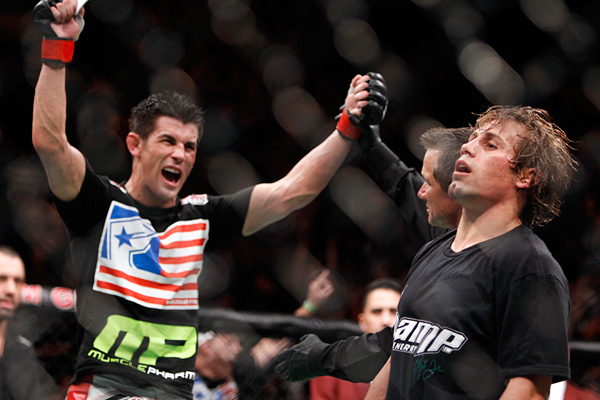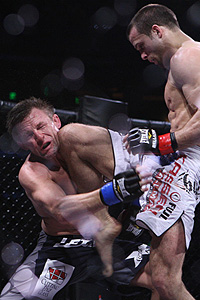Viewpoint: Friday Night Lights

It was eerily quiet for the majority of the two-and-a-half hour premiere of “The Ultimate Fighter Live,” so quiet that you could almost hear disgruntled rumblings from MMA’s ever-fickle fan base in the distance. The fights are too short. The coaches are too calm. The commercials are too frequent. And so on.
Relax. This is not your father’s “TUF,” which sometimes played out like a cleverly edited drama with a generic heavy metal riff as background music. Right now, the Spike TV version of the reality series seems like an old friend, beckoning for you to bask in the comfort of familiarity. The FX version seems a little cold, distant and foreign.
Advertisement
Not surprisingly, there was very little of a these-guys-really-don’t-like-each-other vibe to the proceedings, despite the fact that Cruz and Faber have fought twice and have no plans of attending each other’s family cookouts anytime soon. Chalk that up to the relatively even dispositions of both men, as well as their awareness of the situation; a mic’d-up Rashad Evans and Quinton Jackson in the current format would have virtually guaranteed verbal fireworks, for example. This is something that will vary from season to season depending on the personalities of the coaches.
As for the bouts themselves, one round is a very small sample size
to determine a fighter’s abilities, but the five-minutes-or-bust
format also gave the premiere something of a perpetual “sudden
death” feeling. Was it fair to the competitors, some of whom might
have been slow starters or reliant on superior stamina? Probably
not. Was it exciting and original? Anyone who witnessed Justin
Lawrence’s uber-aggressive assault on two-time
WEC veteran James
Krause would have to say yes.
All told, eight of the premiere’s 16 bouts resulted in finishes, remarkable considering the limited time frame. The grappling-based affair between Dakota Cochrane and James Vick could have used another round, but, largely, the fights were pretty conclusive.
For those lamenting the limited opportunity given to the 16 contestants who did not make it into the house, consider this: “The Ultimate Fighter” is not the end-all for anyone with UFC aspirations; if someone like Cochrane or Krause continues to shine on the regional circuit, Joe Silva or Sean Shelby will find him. Falling short in five minutes of fury might be disappointing, but it does not assure career purgatory.
“The Ultimate Fighter” is evolving, as its recently launched commercial would remind you. Friday’s premiere may have lacked atmosphere and electricity, but it made up for that by squeezing 16 fights into 150 minutes. No other incarnation of the reality series has managed that. For those longing for the good ole days, fear not: White will still swear at the fighters, in-house hijinks will ensue and storylines will develop as the season unfolds. It is just going to look and feel a little different this time.
When to Say When

Dave
Mandel
Curran took it to Warren.
“[The arm] is a little sore, but I came here to put on a fight,” she said.
On Sunday, Tate’s health seemed even less dire than it did that night, as she tweeted: “I had X-rays on my arm the night of the fight, no broken bones. Did an MRI Friday but won’t know the results for another few days.”
In stark contrast to that was the featherweight title clash between Joe Warren and Pat Curran at Bellator 60 on Friday. Clearly the larger fighter, Curran rocked Warren with a head kick in the first round, but the 35-year-old champion remained tenacious in pursuit of takedowns and seemed to right the ship a little bit in round two.
The third frame was difficult to watch. A knee to the head had the self-proclaimed “Baddest Man on the Planet” in retreat mode, and the Illinois native quickly capitalized with furious flurry of punches and knees. As Warren crumpled, with only the cage to hold him upright, Bellator Fighting Championships color analyst Jimmy Smith declared, “This is going to be stopped right now.”
If only he had been correct.
Warren absorbed approximately 15 to 20 more strikes after that proclamation and, for all intents and purposes, was out on his feet. A pair of brutal right uppercuts finally prompted referee Jeff Malott to intervene, but by then it was too late. About halfway through the barrage, Warren briefly stumbled and turned his back to Curran -- a surefire sign that he was nearly done. Still, the beating was allowed to go on.
“Watching the fight right after, I could tell that it could have been stopped a little sooner, but it’s also a title fight so it’s really hard to say. But it could’ve been stopped a lot sooner -- a little bit sooner,” Curran said in a video interview with Sherdog.com.
Therein lies the dilemma. As Strikeforce women’s bantamweight champion, Tate was allowed to have her “Braveheart” ending. Malott attempted to make the same allowance for Warren. With a history of back-from-the-brink fights -- see Cheick Kongo-Pat Barry -- it is not easy to be a referee in those situations.
However, the final results of Tate’s and Warren’s bouts were strikingly different. Tate was in pain but coherent after her fight; Warren had to be helped from the cage by his cornermen. It was disturbing to see the Greco-Roman specialist --normally one of the most quotable fighters in the sport today -- in that state.
Even if his intentions were good, Malott made the wrong call. The concept of intelligent defense can be applied on the feet, as well as the ground, and Warren had long since failed the IQ test before the fight was stopped.
It was the type of moment that could conceivably put Warren’s long-term well-being at risk. While MMA’s champions deserve to go out on their own terms, it should not come at the expense of the quality of their lives after fighting.
Related Articles






